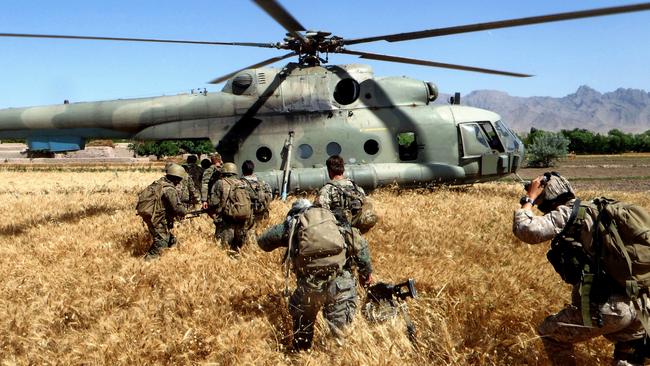Salute to our comrades in the Afghan fight

How could this have happened so quickly? What more could we have done? What will happen to our Afghan counterparts?
There will be plenty of current and former senior military officers, as well as countless numbers of commentators, who will attempt to explain what happened and why. Interviews will be broadcast and books will be written.
Some will suggest it was a lack of resources. Some will point to the fractured religious and tribal groups. Some may attribute a lack of political will and grand strategy among troop-contributing nations. Some will describe the endemic corruption of senior Afghan officials. Some will blame Pakistan. Others may lament the attempt to turn Afghanistan into a liberal Westphalian-style democracy. There are so many actual and imagined reasons for the collapse of the Afghan government, but for the moment I’ll leave all of that to others.
Today there are only two things on my mind. First, I’m wondering what happened, or will happen, to my Afghan counterparts; second, I’m desperately worried about the mental health of Australian veterans and their families.
There has been much public commentary about a possible ADF rescue mission to evacuate the Afghans who supported us during our time in Afghanistan. Looking at the news reports and social media images coming out of Kabul, the concern is that it is too little and way too late. Either way, it does nothing to help our Afghan National Security Forces counterparts, whom we trained, mentored, advised and assisted on a day-to-day basis.
In 2014 I had the task of mentoring two generals from the Afghan National Army. Neither man was a saint; we knew that. But both men were committed to the mission and the freedom of their nation. One – I’ll call him Haziq to protect his identity – would meet me every week. Before sitting down to discuss the previous and forthcoming weeks, Haziq and I usually would have an informal lunch together, and he would serve the most delightful tea I’d tasted. Through an interpreter, we would exchange stories about our families. We would show photos, laugh about common parenting experiences and talk about our aspirations for our children. Like me, Haziq had a young daughter he clearly adored. But unlike me, Haziq worried that his daughter might not enjoy the education and life opportunities he aspired for her if the Taliban returned.
Today, I’m thinking about Haziq and his family, and wondering what will become of them.
The other group of people on my mind is our veterans. Having lost 41 young Australians in Afghanistan, with hundreds more wounded or maimed, and countless others suffering psychological injuries, this is a particularly tough time for veterans.
It is simply not possible to see the footage of Taliban fighters occupying the presidential palace in Kabul and not feel some sense of forlorn regret.
More than 26,000 Australian service men and women served in Afghanistan. That’s more than 26,000 Australian families that were affected by almost 20 years of deployments to Afghanistan, on top of deployments to East Timor and Iraq. In many respects, it’s harder for the families at home than it is for the deployed personnel. Long absences, infrequent contact, negative news stories and constant uncertainty regarding the wellbeing of their deployed loved one can take a significant toll. Many of those families were destroyed as a result.
So, was it all in vain? Absolutely not. We did our duty and we did it well. Our assigned mission was to prevent Afghanistan from again becoming a haven for the international export of terrorism, and to support the US alliance.
Both aspects of that mission were achieved. Beyond that, we did everything we could to help the people of Afghanistan to stand on their own in our absence, which was an eventual reality. It is an achievement of which we should be proud, despite the return of the Taliban.
Now more than ever, it is critically important for the nation to wrap its arms around our Afghanistan veterans, with strong expressions of reassurance, support and gratitude.
So, I say to our veterans, hold your heads up high and don’t lose heart. Your service will always matter. Look out for each other, and each other’s families, and please ask for help if you need it.
Marcus Thompson is a retired major general who served 34 years in the Australian Army. His service included deployments to East Timor, Iraq and Afghanistan.


Like so many of the thousands of Australians who deployed to Afghanistan as members of the Australian Defence Force, I have watched the news from Kabul with a mixture of shock, anger, sadness and helpless frustration.